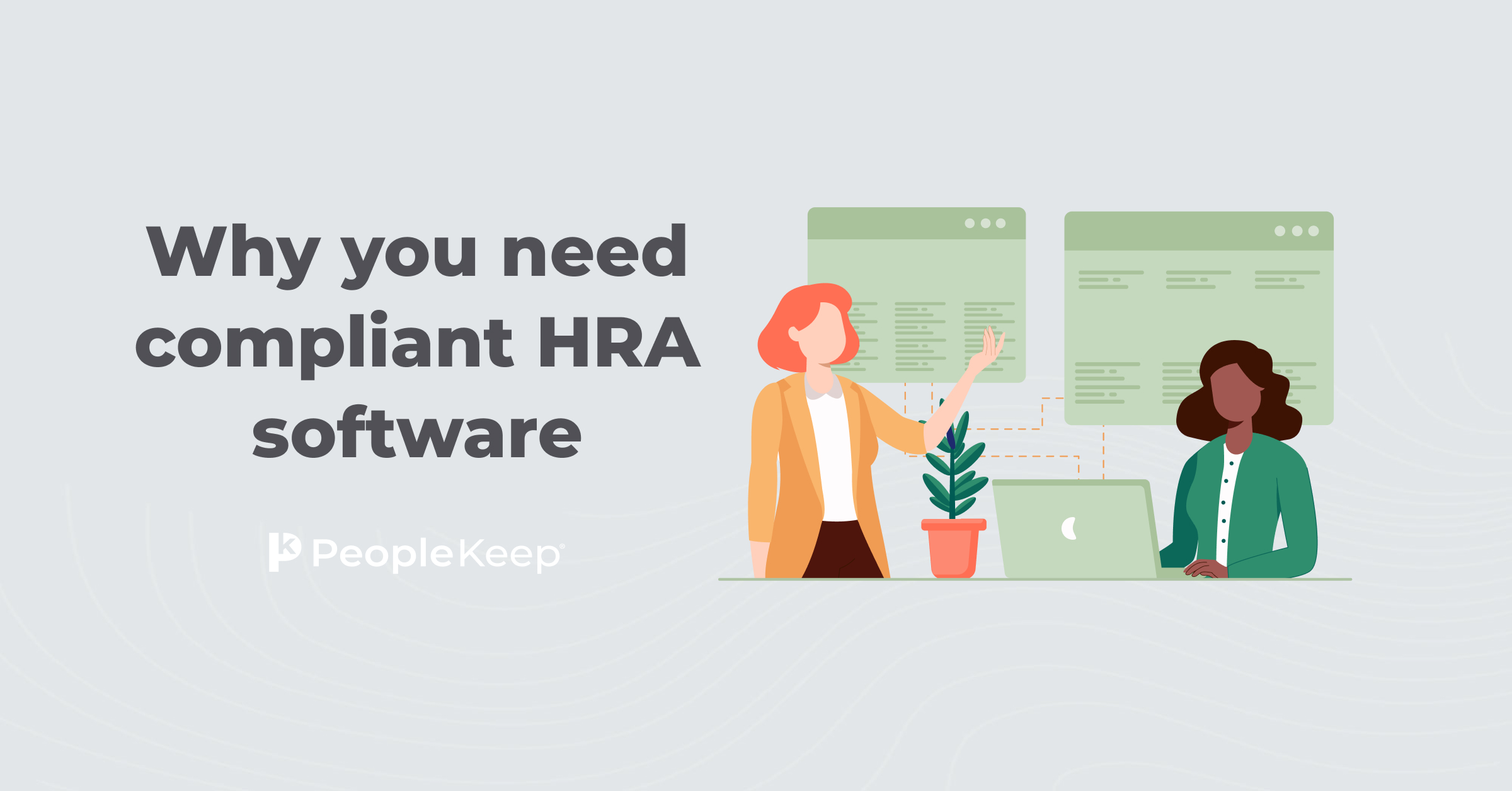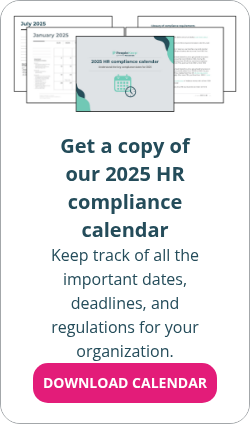Is your business HR compliant? Our HR checklist can help
By Holly Bengfort on August 20, 2023 at 1:26 PM
As a small business owner, you may not have a formal human resources (HR) department. This means either you or one of your non-HR employees is left in charge of your organization's HR compliance. With so many state and federal employment laws that are constantly changing, this could leave you at a higher risk of being subject to penalties and fines.
Formal HR audits are commonplace within some organizations, but every business can benefit from a yearly audit. Ensuring that your company follows all relevant compliance laws not only protects you from potential legal action but also contributes to a positive and productive work environment.
To help you assess your business's HR legal standing, we've created a comprehensive compliance checklist that covers the essential areas.
Are your employee files up-to-date?
First, you may need to maintain many files at your organization, depending on the types of employees you hire and what benefits you provide. The most common types are Form I-9, personnel files, and medical files.
Form I-9 compliance
You use Form I-9 to verify that your employees are authorized to work in the United States. It's also called an Employment Eligibility Verification form. The Immigration Reform and Control Act of 1986 (IRCA) prohibits organizations from knowingly employing workers who aren't authorized to work.
Failing to comply with the law regarding I-9 forms can land your organization in serious trouble. The Department of Homeland Security1 increased fines in 2023.
The fines2 for hiring unauthorized workers are:
- $676 to $5,404 for a first offense
- $5,404 to $13,508 for a second offense
- $8,106 to $27,108 for a third offense
To ensure I-9 compliance, always use the most up-to-date version of the form for new hires. You should also conduct an internal audit, ensuring you have a form for every employee. If you find any errors, correct them immediately to avoid any risks associated with improper documentation.
Personnel files
Your employee records should include all job-related documentation and information about your workforce. This includes hiring records, performance reviews, and disciplinary actions. You should also keep documents your employees have signed, such as non-compete or confidentiality agreements.
Other examples of personnel files include:
- Job application forms
- Tax forms
- Resumes
- Interview scripts or interview questions
- Internal job descriptions
- Performance reviews
- Pay and compensation packages
- Employee contracts
Personal documents that include your employees' Social Security Numbers (SSNs), dependent information, and other confidential information shouldn't be accessible to managers and supervisors that don't need the information for work purposes.
You should keep the following confidential personnel files in their own location:
- Background check results
- Drug tests
- Equal employment opportunity forms
Medical records
You must keep employee medical history confidential and separate from other personnel files per the Americans with Disabilities Act (ADA) regulations.
Your separate medical records files can include documents related to medical leave, accommodations, workers' compensation, and other files applicable to your organization.
Are you paying fair wages?
It's essential to stay up to date with employment laws and pay at least minimum wage to your employees. You must also avoid wage discrimination based on race, gender, or ethnicity. The federal minimum wage is $7.25 per hour. However, it's important to note that many states, counties, and cities have established their own minimum wage laws.
States with a higher minimum wage3 than the federal government include:
- Alaska
- Arizona
- Arkansas
- California
- Colorado
- Connecticut
- Delaware
- Florida
- Hawaii
- Illinois
- Maine
- Maryland
- Massachusetts
- Michigan
- Minnesota
- Missouri
- Montana
- Nebraska
- Nevada
- New Jersey
- New Mexico
- New York
- Ohio
- Oregon
- Rhode Island
- South Dakota
- Vermont
- Virginia
- Washington
- West Virginia
Minimum wage laws aren’t the only consideration for your organization. Various anti-discrimination laws aim to promote equal pay for employees.
Employers are subject to the Equal Pay Act, which requires employers to pay their employees equally for equal work regardless of gender. Title VII of the Civil Rights Act of 1964, the Age Discrimination in Employment Act, and the ADA further prohibit wage discrimination based on race, religion, national origin, age, or disability.
Furthermore, the Fair Labor Standards Act (FLSA) sets minimum wage, overtime, and child labor laws. It requires employers to provide overtime pay to certain employees. FLSA classifications include exempt and nonexempt employees. Nonexempt employees are entitled to overtime wages for all hours worked above 40 in a workweek.
The applicable overtime rate can be no less than time and one-half your employees' regular pay rates.
Are you classifying employees correctly?
Next, it's important to classify your employees correctly. Whether they’re employees or independent contractors, full-time, part-time, or temporary, classifications will be an important distinction to ensure they are granted their entitlements as a worker.
Classifying your employees correctly has a more significant impact than you may know. Did you know misclassified employees are often denied access to critical benefits and protections such as family and medical leave, overtime, minimum wage, and unemployment insurance?
Additionally, a mistake such as misclassifying an employee as an independent contractor can result in a violation of Form I-9 compliance, which could result in penalties and fines.
Do you have an employee handbook?
One of the most important HR-related tasks you can do is develop an employee handbook that outlines the company's policies, expectations, and benefits. Distribute the handbook to all employees and obtain written acknowledgment of receipt.
A handbook also helps protect your business in case of disputes.
Your employee handbook should cover:
- Company policies such as employee behavior, attendance, overtime, and acceptable dress code
- Paid holidays
- Paydays
- How paid time off (PTO) works
- Your company mission statement, vision, and values
- Equal employment opportunity statements
- At-will employment statement if applicable (and allowed)
- ADA reasonable accommodations
- Fair Labor Standards Act (FLSA)
Do you have a compliance calendar?
With so many legal obligations, a compliance calendar can help ensure your organization doesn't miss any crucial deadlines, filing dates, and reporting requirements.
Add quarterly reminders to review your compliance policies and ensure up-to-date compliance practices. You'll also want to list when any taxes or forms are due to federal, state, and local governments, such as an EEO-1 report, if applicable, and quarterly or yearly tax estimates.
If you offer employee benefits, don't forget to include important ACA compliance dates and review your benefits offerings every July. You'll also want to remind employees to take advantage of their benefits on a regular basis.
Alternatively, you can use compliance software to help your organization manage the complexity of employment law.
Do you offer the required employee benefits?
While most employee benefits are voluntarily offered to attract and retain top talent, some benefits are required by federal and state laws.
Workers' compensation
Workers' compensation insurance is required in most states to protect employees and employers due to a workplace injury or illness.
Health coverage
You may also have to provide health insurance for your workers. Under the Affordable Care Act, any applicable large employer (ALE) with 50 or more full-time equivalents (FTEs) must offer health insurance. Your health plan's coverage must satisfy the employer shared responsibility provisions, also known as the employer mandate. This includes standards for minimum essential coverage (MEC) and minimum value.
There are many different affordable healthcare options available that can help you satisfy federal compliance rules. One of these options is a health reimbursement arrangement (HRA).
Specifically, an individual coverage HRA (ICHRA) can help you meet the ACA's employer mandate and MEC. With an ICHRA, you can reimburse your employees tax-free for their qualifying medical expenses, including individual health insurance premiums.
Family and medical leave
The Family and Medical Leave Act (FMLA) allows eligible employees of employers with 50 or more employees to take unpaid, job-protected leave for qualifying family and medical reasons.
Some states go a step further by requiring paid leave, as well as paid sick leave.
States that require paid family and medical leave4 include:
- California
- Colorado
- Connecticut
- District of Columbia
- Delaware
- Massachusetts
- New Hampshire
- New Jersey
- New York
- Oregon
- Rhode Island
- Washington
- Wisconsin
Disability insurance
While disability insurance isn't mandated federally, a few states require it.
Employees in the following states and territories must be offered disability insurance:
- California
- Hawaii
- Rhode Island
- New Jersey
- New York
- Puerto Rico
Remote employee expense reimbursement
Some states require employers to reimburse their employees for remote work expenses, such as internet access costs, cell phone bills, and the cost of tools necessary for the job.
Retirement plans
While most states don't require employers to offer retirement benefits, there are exceptions. Many states mandate employers to participate in state-sponsored retirement plans or provide their own benefits.
States with government-sponsored retirement plans include:
- California
- Colorado
- Connecticut
- Illinois
- Maine
- Maryland
- New Jersey
- Oregon
- Virginia
- Washington
New York passed legislation to require retirement plans, but the law hasn't been implemented.
Are your health benefits compliant?
Because many small businesses can’t afford traditional group health insurance plans, many have chosen to reimburse their employees for individual health insurance premiums. If this is the case, your plan must be compliant.
Like many other federal compliance issues, you could face severe fines and penalties if your plan isn't compliant. For this reason, many small businesses choose a third-party administrator or a benefits administration platform like PeopleKeep for their health benefits.
Conclusion
By conducting HR compliance audits regularly, you can protect your business, focus on building an environment that retains your employees, and ultimately contribute to its long-term growth and success. Remember, legal compliance is an ongoing process. As employment laws change, an annual review can help you stay up-to-day in your internal policies and procedures.
This HR compliance audit checklist contains helpful information, not tax or legal advice. Always consult with your legal counsel or a tax adviser about legal requirements to make sure you fully understand HR compliance regulations.
Ready to offer compliant employee benefits? PeopleKeep can help! Our HRA administration software helps organizations like yours set up and manage their health benefits in minutes each month.
This blog article was originally published on February 11, 2015. It was last updated on August 10, 2023.
Check out more resources
See these related articles

Why you need compliant HRA software
Learn why compliant HRA administration software is essential. Ensure proper setup, reimbursements, and IRS compliance with the right tools.

The differences between partnering with a PEO or a broker
Learn the key differences between partnering with a PEO or a broker. Discover which option best suits your business's HR, benefits, and compliance needs.

Key HR compliance dates for 2026
Keep track of important HR compliance dates in 2026 with this easy-to-use calendar. Don't let compliance issues catch you off guard.



